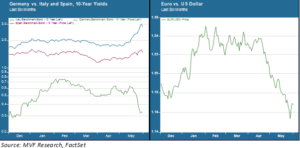
2011, 2012, 2015…ah, memories of summertime Eurozone crises past. On the cusp of the summer of ’18 it would appear not entirely unreasonable to imagine that we are due for another languid spell of troubled waters across the Atlantic. Political dysfunction in the southern periphery was on full display this week, first with Italy’s fumbling attempt to form a new government and then with a no-confidence vote shoving Spanish PM Mariano Rajoy out of office in favor of Socialist Party leader Pedro Sanchez. Word is that Rajoy sat out the parliamentary hearings leading to his ouster, choosing to spend those eight hours in a Madrid restaurant instead. Respect.
Oh, and the US went ahead and imposed steel and aluminum tariffs on the EU, leading EU trade commissioner Cecilia Malmstrom to pronounce a “closed door” on EU-US trade liberalization talks. Abandon hope, ye bourbon drinkers of Europe. The euro continued its slide while investors hugged onto German Bunds like a Steiff bear, illustrated in the charts below.

Mattarella Mio!
The big drama this week, of course, came courtesy of Italian president Sergio Mattarella as he gave a Roman thumbs-down to the cabinet submitted by the recent populist partnership of the Five Star Movement and Northern League (see here for our analysis last month of the implications of this partnership). The move caught investors by surprise and Italian bond yields soared (the blue line in the leftmost chart above).
It may seem counterintuitive that Mattarella’s move sparked a negative market reaction. After all, his opposition to the cabinet slate was focused on the proposed finance minister Paolo Savona, an outspoken critic of the single currency union. The resulting impasse with the FSM/League coalition led to a proposed caretaker government led by Carlo Cottarelli, a former IMF official. That sounds awfully market-friendly…but no, investors read this as a resurgence of the “in or out” question that last reared its head with the Greek financial crisis of July 2015. The thinking was that Mattarella’s technocratic move would give a new tailwind to the Northern League (which indeed has seen a sizable bump in the polls this week) and could result in a more decisive victory for the “out” faction in another round of elections this fall. Suddenly “Quitaly” was the new “Brexit.”
Trouble Ahead, Trouble Behind
The Mattarella tempest resolved itself just in time for markets to breathe a tempered sigh of relief and not pay attention to the no-confidence vote brewing over in Spain. The FSM/League coalition came back with an “acceptable” candidate for finance minister, Giovanni Tria (a political economy professor), Mattarella gave the green light, and all appears ready to proceed apace. Italian assets recovered some lost ground. The can appears safely kicked down the road once again, and now we can all relax and start watching the World Cup, right?
Perhaps not. There are challenges aplenty for this new, not entirely stable coalition government in Italy – on domestic debt levels, on immigration, and – yes – on the general relationship with Brussels, which is hardly amicable to begin with. And while observers don’t see much in the way of market ripples coming from the recent events in Spain, the fact remains that the no-confidence vote there came about due to revelations of political corruption and a slush fund operated by senior members of former PM Rajoy’s Popular Party – another blow to Establishment credibility. The new government led by the Socialists includes an unwieldly array of coalition partners including nationalist Basque and Catalonian factions and the far-left Podemos Party – so there is hardly a unifying ideology there.
In fact, very little about Europe’s political environment looks stable. Nationalist and borderline fascist blocs control much of the eastern periphery of the EU, Germany’s “grand coalition” is struggling, and all the while thorny issues with Brexit persist on the western front. The economy has reverted to slow-growth mode, the ECB is trying to navigate its way out of its monetary stimulus obligations, and now Brussels needs to rally the troops around a united response to those ill-advised US tariffs.
It may be summertime, but the living would appear to be anything but easy.